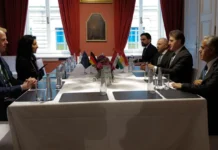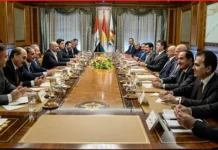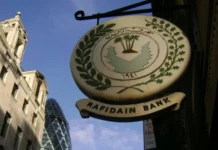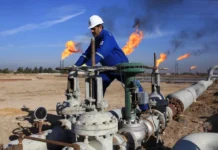Tishwash: Can Iraqi oil be sold in currencies other than the dollar?
Economic researcher, Ziad Al-Hashemi, commented on the reality of demands to sell oil in currencies other than the dollar.
Al-Hashemi said in a post on the “X” platform, followed by “Jarida”, that “there are emotional parliamentary and non-parliamentary demands demanding that the Iraqi government sell oil in currencies other than the dollar.”
Regarding the logic and realism of these demands, the economic researcher explains, “Theoretically, Iraq and other countries can sell their oil exports in any currency other than the dollar. This is a sovereign decision for the state and it has the freedom to make it, but oil is an economic and political weapon that has a direct impact on the global economy.” There is high sensitivity and caution when dealing with oil as an export commodity, as everything related to oil has international economic and even political repercussions.”
He added, “The global oil pricing currency is the dollar, and there is a strong interconnection between a barrel of oil and the US dollar, which after 1973 was determined by what is called the petrodollar, and any violation of this rule will incur very large losses to Iraq, which will go to exchange rate differences between the dollar and the rest of the currencies.”
Al-Hashimi stated, “The oil-producing countries sell their oil exclusively in dollars, to perpetuate their interests and strategic relations with the United States. Therefore, selling oil for anything other than the dollar is considered a kind of challenge or preparation to enter into a conflict or a state of war with the United States, and here we find that Iraq describes itself as a friend and even an ally of the United States, and its government has no desire to open a confrontation front with the Americans.”
He continued, “The dollar is used to price, buy and sell approximately 60% of the volume of global trade, and this gives countries that receive the dollar great flexibility and strength in managing their trade and imports. When oil is sold in currencies other than the dollar, Iraq will lose this important advantage.”
The economic researcher concluded by saying, “The decision to abandon the sale of oil in dollars is a huge strategic decision that carries risks and wide political and economic consequences that could negatively affect the future of Iraq for decades to come. Therefore, it does not make sense to use this decision as a means of expressing anger at the Americans or As an emotional reaction to the Fed’s sanctions. link
************
CandyKissses: Integrity reveals irregularities and waste of public money in investment projects worth (10) billion dinars in Dhi Qar
Economy Baghdad News
The Federal Integrity Commission revealed violations and waste of public money estimated at ten billion dinars in investment projects in Dhi Qar Governorate.
The authority stated in a statement, seen by “Economy News”, that “the work team of the Commission’s investigation office in Dhi Qar set the priorities of three investment licenses in the Governorate Investment Authority, after noticing that they committed violations in them,” indicating that “the authority did not follow up the contracting mechanism between the investor and the beneficiaries of the housing units in a residential investment complex at a cost of (5,589,785,000) billion dinars,” explaining that the Dhi Qar Oil Company committed violations in the project to establish a residential complex with (2,742,625,000) two billion dinars.
In its statement, the authority pointed to “the monitoring of waste of public money in a residential investment complex for public employees, represented by the State Real Estate Department in the province transferring the ownership of land to the municipality of Nasiriyah, which in turn granted it to an investor, contrary to the controls, which led to depriving employees of the Military Housing Directorate of allocating it as plots of land for officers and ranks, as well as depriving the state treasury of obtaining funds resulting from the sale of land.”
The statement pointed out that “the Investment Authority and the municipality of Nasiriyah manipulated and transferred the license of an investment project at a cost of (2,000,000,000) two billion dinars from one investor to another under the pretext of waiving the first investor.”
In its statement, the authority confirmed “the occurrence of waste of public money in the process of selling (16) residential plots of land in the municipality of Nasiriyah at auctions at prices that do not match the prevailing prices in the market, pointing out that auctions were organized in a formal manner and the auction of each piece was limited to one person, despite their previous benefit.”
On the other hand, the authority said that “in the Directorate of Education in the governorate, the team noticed violations of instructions and controls in the restoration and rehabilitation of (4) schools at a cost of (486,819,000) million dinars, within the “Emergency Support for Food Security and Development” program.
************
CandyKisses: In an emergency meeting.. State administration condemns US bombing and considers it a serious attack
Shafaq News / The State Administration Coalition held an emergency meeting on Sunday, at the invitation of Prime Minister Mohammed Shia Al-Sudani, and in the presence of President Abdul Latif Rashid, to follow up on the developments of “serious events” in the country, according to a statement issued by the coalition and reported to Shafaq News.
In its statement, the coalition expressed its “strong condemnation of the American aggression that targeted the sites of the Popular Mobilization on the night of February 2/3, and resulted in the martyrdom and injury of dozens of affiliates and civilians, which is a serious attack on an official Iraqi security institution, which represents a violation of Iraq’s sovereignty and security, and a violation of international norms and laws governing relations between countries.”
The coalition renewed its authorization to the government and its support for the dialogue it is conducting with the international coalition to end this presence with understanding and dialogue, in order to ensure the building of bilateral relations between Iraq and the countries of the international coalition, which was confirmed in the recent agreement between Iraq and the United States.
The coalition expressed its rejection of all forms of attacks against Iraqi military bases, as well as the targeting of military advisers, from the countries of the international coalition who work within specific advisory and training tasks.
The coalition stressed the support of the government in not allowing any party to drag Iraq into the arena of conflict in the region, and the supreme national interest of Iraq must be placed above any other interest, and that the responsibility of everyone is to ensure the maintenance of security and stability in the country, which was achieved through great sacrifices made by our people and our armed forces of all kinds.
Early on Saturday morning, the U.S. Army Central Command reported that its forces had launched airstrikes in Iraq and Syria targeting positions of the Islamic Revolutionary Guard Corps’s Quds Force and militia groups.
U.S. military forces hit more than 85 targets with several aircraft housing long-range bombers launched from the United States, the command said in a statement.
According to the statement, the airstrikes used more than 125 precision-guided munitions, noting that the targets included command and control headquarters, intelligence centers, missile, draves, ammunition and logistics supplies belonging to the militias and the Revolutionary Guards.
US President Joe Biden had directed military forces to strike targets in Iraq and Syria used by the Iranian Revolutionary Guards and their affiliated militias to attack US forces, he said, stressing that although the United States does not seek an escalation in the Middle East, it will inevitably respond to those who harm Americans.
White House National Security Council spokesman John Kirby confirmed Saturday that the Iraqi government had already been informed before launching the airstrikes.
In turn, the spokesman for the Iraqi government on behalf of Al-Awadi denied that there was prior coordination between Baghdad and Washington on the strikes by US forces targeting the positions of the security forces in the western province of Anbar, confirming that 16 dead and 25 wounded as a result of that “aggression.”
On Saturday, the Iraqi Foreign Ministry summoned the Chargé d’affaires a.i. at the U.S. Embassy in Baghdad David Berker in protest against the bombing.





